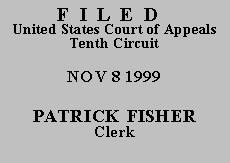

| ARLEY LEE DUNCAN, | No. 99-6029
(D.C. No. CIV-98-1226) |
In 1983, Duncan was charged with and pleaded guilty to first degree felony murder in the District Court of Oklahoma County, Oklahoma, case number CRF-83-3116. Duncan was sentenced to life imprisonment with the possibility of parole. In accordance with Oklahoma law in effect at that time, Duncan's life sentence was of indeterminate length.
The Oklahoma Truth in Sentencing Act (the "Act") was signed into law in 1997 and modified various aspects of Oklahoma law pertaining to sentencing and parole. See 1997 Okla. Sess. Laws ch. 133. As it pertains to the present case, the Act provides that persons sentenced to life imprisonment with the possibility of parole receive a determinate sentence of eighteen to sixty years. See Okla. Stat. tit. 21, § 14. The Oklahoma Court of Criminal Appeals has interpreted this amendment to be purely prospective in its effect. See Castillo v. Oklahoma, 954 P.2d 145 (Okla. Crim. App. 1998); Nestell v. Oklahoma, 954 P.2d 143 (Okla. Crim. App. 1998).
Duncan filed a federal habeas petition pursuant to 28 U.S.C. § 2254 on August 17, 1998 in United States District Court for the Western District of Oklahoma. Duncan claimed that the failure to modify his indeterminate life sentence pursuant to the sentencing provisions of the Act violates his equal protection and due process rights under the Constitution. Duncan argued that the retrospective nature of the Act's parole eligibility requirements compels modification of his sentence. See Okla. Stat. tit. 57, § 332.7. Duncan reiterates these arguments on appeal to this court.
The district court, adopting the report and recommendation of the magistrate judge, concluded that Duncan is not entitled to receive a determinate sentence under the Act and found no violation of Duncan's equal protection or due process rights. After reviewing the relevant case law, the file and the arguments made by Duncan, both below and on appeal, we conclude that he has not made a substantial showing of the denial of a constitutional right for substantially the same reasons Duncan's claims were rejected by the federal district court in its Order of November 25, 1998. Accordingly, we DENY COA on all issues.
The mandate shall issue forthwith.
ENTERED FOR THE COURT
David M. Ebel
Circuit Judge
*.After examining appellant's brief and the appellate record, this panel has determined unanimously that oral argument would not materially assist the determination of this appeal. See Fed. R. App. P. 34(a)(2) and 10th Cir. R. 34.1(G). The case is therefore ordered submitted without oral argument. This Order and Judgment is not binding precedent, except under the doctrines of law of the case, res judicata, and collateral estoppel. The court generally disfavors the citation of orders and judgments; nevertheless, an order and judgment may be cited under the terms and conditions of 10th Cir. R. 36.3.